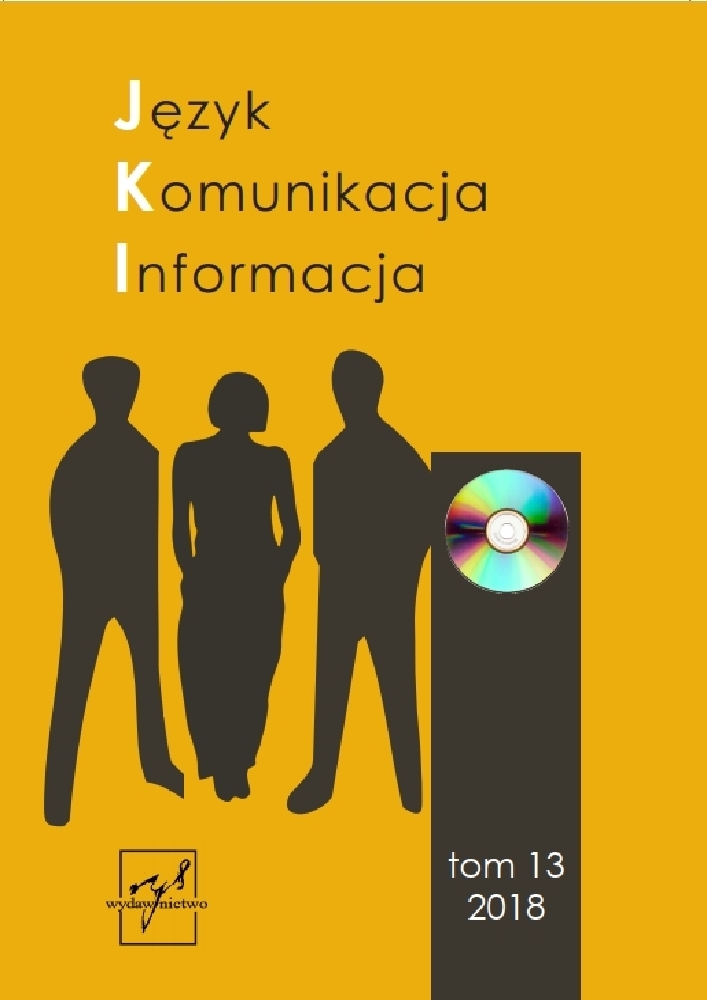Abstrakt
Most papers analysing Bram Stoker’s Dracula concentrate on the Gothic tradition in which it is embedded, although another interesting feature of the novel is that it includes diary entries, logs, letters and other types of texts. Focusing on the complex issue of the novel’s genre, we use an interdisciplinary methodology based on Bakhtin’s theoretical work and the principles of functional pragmatics to highlight the importance of these text types, especially that of the diary, and to detect some of the special features of the genre. Diaries are not only texts produced in the scope of the narrative but they also function as a mental shelter, a moral obligation, and a weapon. We analyse metapragmatic reflections as signs of metapragmatic awareness belonging to the language act of writing or reading a diary. Finally, we underline the dynamic relation of the genre as an abstract category and as a concrete instance of that category in a text.Bibliografia
Source
Stoker, Bram 2012 [1897]: Dracula. Los Angeles: Reider Books.
Bibliography
Aikens, Kristina 2009: Battling Addictions in Dracula. Gothic Studies 11/2: 41–51.
Altman, Janet Gurkin 1982: Epistolarity. Approaches to a Form. Columbus: Ohio State University Press.
Arata, Stephen D. 1990: The Occidental Tourist. Dracula and the Anxiety of Reverse Colonization. Victorian Studies 33/4: 621–645.
Bakhtin, Mikhail 1986: The Problem of Speech Genres. In: Speech Genres and Other Late Essays. Caryl Emerson and Michael Holquist (eds). Trans. Vern W. McGee. Austin: University of Texas Press. 60–102.
Bentley, Christopher F. 1972: The Monster in the Bedroom: Sexual Symbolism in Bram Stoker’s Dracula. Literature and Psychology 22/1: 27–34.
Brindle, Kym 2013: Epistolary Encounters in Neo-Victorian Fiction. Diaries and Letters. UK: Palgrave Macmillan.
Craft, Christopher 1984: ’Kiss Me with Those Red Lips’: Gender and Inversion in Bram Stoker’s Dracula. Representations 8/Autumn: 107–133.
Field, Trevor 1989: Form and Function in the Diary Novel. Basingstoke: Macmillan Press.
Genette, Gérard 1990: Fictional Narrative, Factual Narrative. Poetics Today 11/4: 755–774.
Genette, Gérard 1997: Paratexts. Tresholds of Interpretation. Cambridge: Cambridge University Press.
Kittler, Friedrich 1997: Dracula’s Legacy. In: Literature. Media. Information Systems: Essays, ed. John Johnston, 50–83. Amsterdam: G+B Arts International.
Ladányi Mária & Tolcsvai Nagy Gábor 2008: Funkcionális nyelvészet ‘Functional Linguistics’. In: Tanulmányok a funkcionális nyelvészet köréből. Általános Nyelvészeti Tanulmányok XXII. Tolcsvai Nagy Gábor & Ladányi Mária (eds). Budapest: Akadémiai Kiadó. 17–58.
Punter, David 2007: Bram Stoker’s Dracula: Tradition, Technology, Modernity. In: Post/modern Dracula. From Victorian Themes to Postmodern Praxis. John S. Bak (ed). Newcastle: Cambridge Scholars Publishing. 31–41.
Richardson, Maurice 1959: The Psychoanalysis of Ghost Stories. Twentieth Century 166/994: 419–431.
Roth, Phyllis A 1977: Suddenly Sexual Women in Bram Stoker’s Dracula. Literature and Psychology 27/3: 113–21.
Sanders, José and Wilbert Spooren 1997: Perspective, Subjectivity, and Modality from a Cognitive Point of View. In Discourse and Perspective in Cognitive Linguistics. Liebert, Wolf-Andreas & Gisela Redeker & Linda R. Waugh (eds.). Amsterdam–Philadelphia: John Benjamins. 85–112.
Seed, David 1985: The Narrative Method of Dracula. Nineteenth-Century Fiction 40/1: 61–75.
Senf, Carol A. 1982: ‘Dracula’: Stoker’s Response to the New Woman. Victorian Studies 26/1: 33–49.
Simon Gábor 2017: Áttekintés a műfajkutatás tendenciáiról és lehetőségeiről. Útban egy kognitív szemléletű műfajelmélet felé ‘An Outline of Tendencies and Possibilities in Genre Research. Towards a Cognitive Genology’. Magyar Nyelv 113/2: 146–166.
Tátrai Szilárd 2011: Bevezetés a pragmatikába ‘Introduction to Pragmatics’. Budapest: Tinta Kiadó.
Tátrai Szilárd 2017: Esti Kornél és a beégés. Megjegyzések a műfajiság pragmatikai vonatkozásaihoz ‘Kornél Esti and Embarrassment. Remarks on the Pragmatic Aspects of Genres’. Magyar Nyelv113/3: 290–301.
Verschueren, Jef 1999: Understanding Pragmatics. London, New York, Sydney, Auckland: Arnold.
Wicke, Jennifer 1992: Vampiric Typewriting. Dracula and Its Media. English Literary History 59/2: 467–493.
Licencja
Polityka Open Access: Czasopismo zapewnia natychmiastowy, otwarty dostęp do wszystkich swoich treści zgodnie z zasadą, że badania swobodnie dostępne zwiększają i przyśpieszają globalny rozwój nauki i wymianę wiedzy.
Nadsyłając zgłoszenia, Autorzy zgadzają się na to, że artykuły w niniejszym czasopiśmie są publikowane w otwartym dostępie (Open Access) i podlegają licencji Creative Commons w wersji 4.0 BY-NC-ND.

